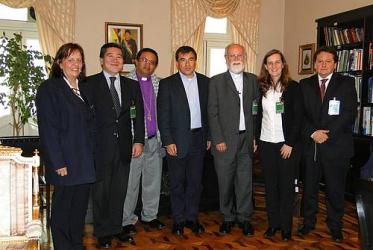The last reflection of the Seven Weeks for Water 2024 series of the WCC Ecumenical Water Network is jointly written by Rev. Audra Hudson Stone and Jacob Stone. They argue that natural disasters are not natural anymore; rather, they are human-induced. These disasters are the groaning of the earth, which is drawing our attention to mend our ways. The Stones are hopeful that, as Jesus rose from the shackles of death, the mother earth, too, will rise from its despair, suffering, and death through the “water of life”—Jesus Christ. To that end, we need to facilitate and practice “resurrection” of the earth!
28 March 2024



